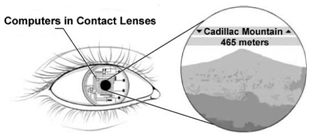
 Imagine looking at a view of mountaintops and wondering about the name of each peak£®Suddenly£¬above each mountaintop£¬a name appears on the sky£®The words are not written in smoke by skywriting planes£®The words are actually not in the sky at all£®They come from tiny computers in contact lenses£¨ÒþÐÎÑÛ¾µ£©£®
Imagine looking at a view of mountaintops and wondering about the name of each peak£®Suddenly£¬above each mountaintop£¬a name appears on the sky£®The words are not written in smoke by skywriting planes£®The words are actually not in the sky at all£®They come from tiny computers in contact lenses£¨ÒþÐÎÑÛ¾µ£©£®·ÖÎö Ö÷Òª½²ÊöÁËÔڿƼ¼Ô½À´Ô½·¢´ïµÄÏÖÔÚ£¬Ðµļ¼ÊõÔËÓÃÓÚ¸÷Ààµç×ÓÉ豸£¬µçÄÔ½«±äµÃÔ½À´Ô½Ð¡£¬°²×°ÓëÒþÐÎÑÛ¾µÖеÄ΢Ð͵çÄÔ½«Ê¹ÈËÃÇÌå»áµ½²»Ò»ÑùµÄÊÓ¾õЧ¹û£®
½â´ð 63£®D ϸ½ÚÌ⣮¸ù¾ÝÎÄÕÂÄÚÈÝParviz created a computer in a contact lens that uses the wearer's field of vision as the display¡By looking in a certain direction£¬the wearer sends the computer visual information about what he or she sees£®´÷ÉÏÄǸöÒþÐÎÑÛ¾µ£¬ÔÚÒ»¸öÌض¨µÄ·½Ïò¿´£¬Åå´÷ÕßÄÜÏòµçÄÔ·¢ËÍta¿´µ½µÄ¾°Ï󣬽áºÏÑ¡Ï¹ÊÑ¡D
64£®A ϸ½ÚÌ⣮¸ù¾ÝÎÄÕÂÄÚÈÝSuch public displays can lead to privacy concerns£» most people do not want their information displayed on a wall for everyone to see£®ÓÉ´Ë¿ÉÖª microprojectors£¨Î¢ÐÍͶӰ»ú£©»á¸øÈËÃǵÄÒþ˽´øÀ´°²È«Òþ»¼£¬½áºÏÑ¡Ï¹ÊÑ¡A
65£®B ϸ½ÚÌ⣮¸ù¾ÝÎÄÕÂÄÚÈÝTransistors£¨¾§Ìå¹Ü£© and then chips allowed computers to become small enough to fit on a desktop£¬then a laptop£¬and finally a phone£®ÓÉ´Ë¿ÉÖª£¬µçÄÔ½«±äµÃÔ½À´Ô½Ð¡£¬½áºÏÑ¡Ï¹ÊÑ¡B
66£®A Ö÷Ö¼Ì⣮¸ù¾ÝÎÄÕÂÄÚÈÝ£¬Ö÷Òª½²ÊöÁËÔڿƼ¼Ô½À´Ô½·¢´ïµÄÏÖÔÚ£¬Ðµļ¼ÊõÔËÓÃÓÚ¸÷Ààµç×ÓÉ豸£¬µçÄÔ½«±äµÃÔ½À´Ô½Ð¡£¬°²×°ÓëÒþÐÎÑÛ¾µÖеÄ΢Ð͵çÄÔ½«Ê¹ÈËÃÇÌå»áµ½²»Ò»ÑùµÄÊÓ¾õЧ¹û£®½áºÏÑ¡Ï¹ÊÑ¡A
µãÆÀ ±¾ÎÄÊǿƽÌÀàÔĶÁÀí½â£®×öÕâÀàÌâ²ÄÔĶÁÀí½âʱҪÇó¿¼Éú¶ÔÎÄÕÂͨ¶ÁÒ»±é£¬×öÌâʱ½áºÏÔÎĺÍÌâÄ¿ÓÐÕë¶ÔÐÔµÄÕÒ³öÏà¹ØÓï¾ä½øÐÐ×Ðϸ·ÖÎö£¬½áºÏÑ¡ÏîÑ¡³öÕýÈ·´ð°¸£®ÍÆÀíÅжÏÌâÒ²ÊÇÒªÔÚץס¹Ø¼ü¾ä×ӵĻù´¡ÉϺÏÀíµÄ·ÖÎö²ÅÄܵóöÕýÈ·´ð°¸£¬ÇмɺúÂҲ²⣬һ¶¨Òª×öµ½ÓÐÀíÓоÝ


 A¼Ó½ðÌâ ϵÁдð°¸
A¼Ó½ðÌâ ϵÁдð°¸ È«ÓŲâÊÔ¾íϵÁдð°¸
È«ÓŲâÊÔ¾íϵÁдð°¸
| Ä꼶 | ¸ßÖÐ¿Î³Ì | Ä꼶 | ³õÖÐ¿Î³Ì |
| ¸ßÒ» | ¸ßÒ»Ãâ·Ñ¿Î³ÌÍƼö£¡ | ³õÒ» | ³õÒ»Ãâ·Ñ¿Î³ÌÍƼö£¡ |
| ¸ß¶þ | ¸ß¶þÃâ·Ñ¿Î³ÌÍƼö£¡ | ³õ¶þ | ³õ¶þÃâ·Ñ¿Î³ÌÍƼö£¡ |
| ¸ßÈý | ¸ßÈýÃâ·Ñ¿Î³ÌÍƼö£¡ | ³õÈý | ³õÈýÃâ·Ñ¿Î³ÌÍƼö£¡ |
¿ÆÄ¿£º¸ßÖÐÓ¢Óï À´Ô´£º ÌâÐÍ£ºÐÅϢƥÅä
²é¿´´ð°¸ºÍ½âÎö>>
¿ÆÄ¿£º¸ßÖÐÓ¢Óï À´Ô´£º2016-2017ѧÄêºÓÄÏÊ¡ÉÌÇðÊоÅУ¸ßÒ»ÏÂѧÆÚÆÚÖÐÁª¿¼Ó¢ÓïÊÔ¾í£¨½âÎö°æ£© ÌâÐÍ£ºÔĶÁÀí½â
When enjoying children's birthdays or a long-expected family holiday,you may usually want to keep those important moments in mind with a photograph.But if you¡¯re one of those people who can¡¯t stop snapping photos at an important event,be aware--you could end up forgetting it all in a flash.
Experts have warned that the addiction to recording every moment of our lives could be having an adverse effect on our memories.
Maryanne Garry,a New Zealand psychology professor,has been studying how the frequent taking of photos might change childhood memories.I think the problem is that people are forgetting to experience the moment,she says.Parents at the park taking one photo after another of their children,for example,are actually paying less attention to what is happening around them.The picture only captures a small part of the total experience.And because parents remember less about these important events,they become less effective in their role as the key people who help children learn how to talk about their experiences.As a result,children's own childhood memories are reduced.
The idea that we are experiencing less as we record more got psychologist Linda Henkel¡¯s thinking.She wanted to explore how photographs shape our memories.
Henkel,who researches human memory at Fairfield University in Connecticut,did an experiment by sending groups of students to the university¡¯s art museum.The students observed some objects and photographed others. Then,back at the laboratory,they were given a memory test.Henkel found what she called a ¡°photo-taking effect¡±.The students remembered fewer of the objects that they had taken photos of,and they remembered fewer details about those objects.She says her students¡¯ memories were worse because they were relying on the camera to remember the details for them.
¡°As soon as you hit ¡®click¡¯ on that camera,it¡¯s as if you¡¯ve decreased your memory.¡± she says.
1.What does the word ¡°it¡± in Paragraph 1 refer to?
A. A child¡¯s birthday.
B. An important event.
C. A valuable photograph.
D. A family holiday.
2.How did Henkel develop her theory about the ¡°photo-taking effect¡±£¿
A. By carrying out an experiment.
B. By giving a questionnaire.
C. By interviewing a group of students.
D. By researching the findings of the others.
3.According to Paragraph 3,why are children¡¯s memories reduced?
A. Flash lights are causing children to forget more things.
B. Parents are into listening to children¡¯s experiences.
C. Children are more into taking photos than experiencing.
D. Parents are less effective in helping children discuss their experiences.
4.What¡¯s the purpose of this passage?
A. To introduce a new discovery in taking photos.
B. To discuss the effect of photo-taking on memory.
C. To explain how to use cameras in an effective way.
D. To describe the ways of remembering valuable experiences.
²é¿´´ð°¸ºÍ½âÎö>>
¿ÆÄ¿£º¸ßÖÐÓ¢Óï À´Ô´£º ÌâÐÍ£º½â´ðÌâ
²é¿´´ð°¸ºÍ½âÎö>>
¿ÆÄ¿£º¸ßÖÐÓ¢Óï À´Ô´£º ÌâÐÍ£ºÑ¡ÔñÌâ
| A£® | is putting off | B£® | was put off | ||
| C£® | had been put off | D£® | would put off |
²é¿´´ð°¸ºÍ½âÎö>>
¿ÆÄ¿£º¸ßÖÐÓ¢Óï À´Ô´£º ÌâÐÍ£ºÐÅϢƥÅä
²é¿´´ð°¸ºÍ½âÎö>>
¿ÆÄ¿£º¸ßÖÐÓ¢Óï À´Ô´£º ÌâÐÍ£ºÑ¡ÔñÌâ
| A£® | lack | B£® | load | C£® | question | D£® | waste |
²é¿´´ð°¸ºÍ½âÎö>>
¿ÆÄ¿£º¸ßÖÐÓ¢Óï À´Ô´£º ÌâÐÍ£ºÑ¡ÔñÌâ
| A£® | that | B£® | whether | C£® | why | D£® | what |
²é¿´´ð°¸ºÍ½âÎö>>
¿ÆÄ¿£º¸ßÖÐÓ¢Óï À´Ô´£º ÌâÐÍ£º¶ÌÎĸĴí
²é¿´´ð°¸ºÍ½âÎö>>
°Ù¶ÈÖÂÐÅ - Á·Ï°²áÁбí - ÊÔÌâÁбí
ºþ±±Ê¡»¥ÁªÍøÎ¥·¨ºÍ²»Á¼ÐÅÏ¢¾Ù±¨Æ½Ì¨ | ÍøÉÏÓк¦ÐÅÏ¢¾Ù±¨×¨Çø | µçÐÅթƾٱ¨×¨Çø | ÉæÀúÊ·ÐéÎÞÖ÷ÒåÓк¦ÐÅÏ¢¾Ù±¨×¨Çø | ÉæÆóÇÖȨ¾Ù±¨×¨Çø
Î¥·¨ºÍ²»Á¼ÐÅÏ¢¾Ù±¨µç»°£º027-86699610 ¾Ù±¨ÓÊÏ䣺58377363@163.com